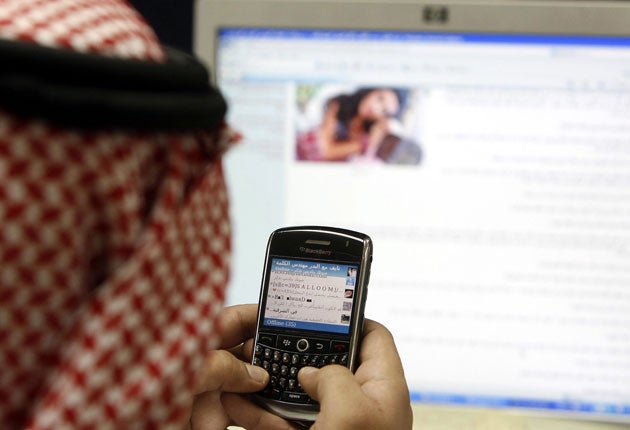BlackBerry users told: text away, so long as we can spy on messages
Deal is reached – at a price – to avert ban on the device's use in Saudi Arabia, but other large countries remain unhappy

For BlackBerry users in Saudi Arabia and possibly elsewhere, there is good news and bad this weekend. The good is that the oil kingdom and the makers of the smartphone have reached a deal on accessing users' data that will avert a ban on the phone's messaging service, a Saudi official said yesterday. The bad is that the agreement involves placing a BlackBerry server inside Saudi Arabia, which would allow the government to monitor users' messages.
The deal could have wide-ranging implications for several other countries, including India and the United Arab Emirates, which have expressed similar concerns over how the BlackBerry's maker, Research in Motion, handles its data. The Saudi regulatory official, who spoke on condition of anonymity because he was not authorised to discuss the deal's details, said tests are now under way to determine how to install a BlackBerry server inside the country. The agreement is meant to allay fears that the messaging service could be used for criminal purposes.
Saudi Arabia is one of a number of countries expressing concern that the device is a security threat because encrypted information sent on the phones is routed through overseas computers – making it impossible for local governments to monitor. The UEA has announced it will ban BlackBerry email, messaging and web browsing in October, and Indonesia and India are also demanding greater control over the data. Concerns have also been expressed in Lebanon.
Analysts say RIM's expansion into emerging markets is threatening to set off a wave of regulatory challenges, as its commitment to keep corporate emails secure rubs up against the wishes of local law enforcement. RIM says it does offer help to governments, but says its technology does not allow it, or any third party, to read encrypted emails sent by corporate BlackBerry users. The consumer version has a lower level of security.
In Saudi Arabia – which local media say has some 750,000 BlackBerry users – the threat of a ban raised accusations that the government is trying to further curb freedom of expression. Saudi security officials fear the service could be used by militant groups. For years, the kingdom has been battling against extremists linked to al-Qa'ida. It also enforces heavy policing of the internet, blocking sites for political and obscene content.
BlackBerry phones are known to be popular among businesspeople and youngsters in the kingdom, who see the phone's relatively secure communications features as a way to avoid attention from the authorities. Expectations of the ban have pushed some to sell their devices. At Riyadh's main mobile phone market, dozens of young men were trying to sell their handsets, some in their original packaging, many at half the normal price.
"Nobody buys them now," said Nour al-Zaman, a stall-owner in the market. He said his shop had cut prices for a new BlackBerry from $300 (£188) to $100.
Join our commenting forum
Join thought-provoking conversations, follow other Independent readers and see their replies
Comments
Bookmark popover
Removed from bookmarks